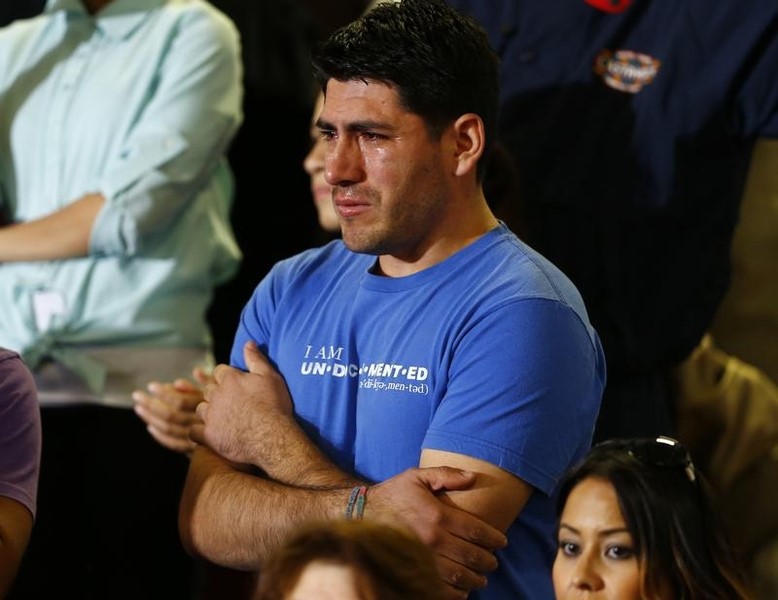By James Oliphant
WASHINGTON (Reuters) - For a Republican Party trying to woo Hispanic voters, the timing of the U.S. Supreme Court's review of the legality of President Barack Obama's executive action on immigration could not come at a more awkward time.
The case, which will consider whether Obama exceeded his constitutional authority to spare from deportation millions of immigrants in the country illegally, is set to be argued in the coming months with a decision due by the end of June.
That would land the issue squarely in the middle of the U.S. presidential race, just weeks before Republicans gather for their convention to choose a nominee in November's election.
A Supreme Court win for the Republican-governed states that sued to block Obama's action surely would have conservatives in the party celebrating but might have those in the party who are concerned about reaching Hispanic voters fretting.
"As a Republican, you would take a quick victory lap and then not talk about it," said Rodell Mollineau, a Democratic strategist and former aide to Senator Harry Reid of Nevada. "Either way, whatever happens, you want it to happen quickly."
Republican strategists have long worried that the hard-line stance taken by the likes of Donald Trump and Ted Cruz toward Obama's immigration policies would cost the party the opportunity to secure the badly needed support of Hispanic voters in the general election.
In the 2012 election, Hispanic voters preferred Obama over Republican nominee Mitt Romney by a massive margin, 71 percent to 27 percent, causing Republican leaders afterward to warn that if the party did not start broadening its appeal to that swiftly growing demographic, it would be on the losing end of presidential contests for years to come.
John Feehery, a Republican strategist who has argued that the party needs to a do a better job courting Hispanics, conceded that those voters largely would blame Republicans if Obama's policy is blocked by the justices.
But, Feehery said, those voters also might fault Obama for trying to bypass Congress to do something he was not empowered under the Constitution to do, setting back the cause of immigration reform in the process. Hispanic advocates are already angry with Obama over recent deportation raids by the Department of Homeland Security.
"Latino voters will of course blame Republicans, but should the Supreme Court decide against the president, he will blamed also, especially in conjunction with his increased enforcement against illegals," Feehery said.
Democratic presidential candidates seemed eager on Tuesday to have the court rule on the case, contending that it provides an opportunity for the court to ratify the president's action and end the debate over its legality. And they seemed mindful of the issue's potency on the campaign trail.
"(Obama's) action should be upheld so families can stay together and live without fear of deportation," Hillary Clinton, the front-runner for the Democratic nomination, wrote on Twitter (N:TWTR).
Her top rival, Senator Bernie Sanders of Vermont, said he was "confident the president has the legal authority" for the order. Sanders called on Congress to move forward on immigration reform, but pledged that, as president, "he would uphold and expand the president's action."
Criticism of the 2014 executive order, and of the president's use of his executive authority generally, has been standard fare among Republicans on the campaign trail.
Cruz, a senator from Texas and a leading contender for the Republican nomination, has been a long-time critic of Obama's immigration policies.
Cruz, a Harvard-trained lawyer and former Supreme Court clerk who once served as his state's top advocate before the high court, said it was significant that the justices will decide whether Obama violated the U.S. Constitution's requirement that presidents "take care that the laws be faithfully executed."
"He did not do that, and I trust that the court will reach that conclusion," Cruz said.
Senator Marco Rubio of Florida, who co-sponsored bipartisan immigration legislation that passed the Senate in 2013 but died in the House of Representatives, has also been a longstanding critic of Obama's use of executive power. Rubio has since backtracked on his support for the legislation.
"I'm confident (the Supreme Court) will agree Obama executive orders are unconstitutional," Rubio wrote on Twitter. "Regardless, as president, I will end them."
